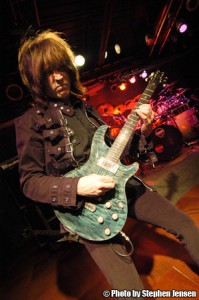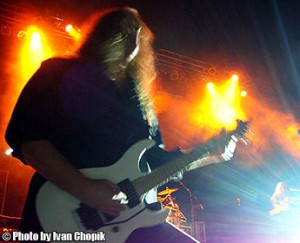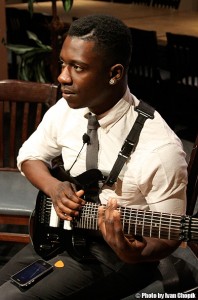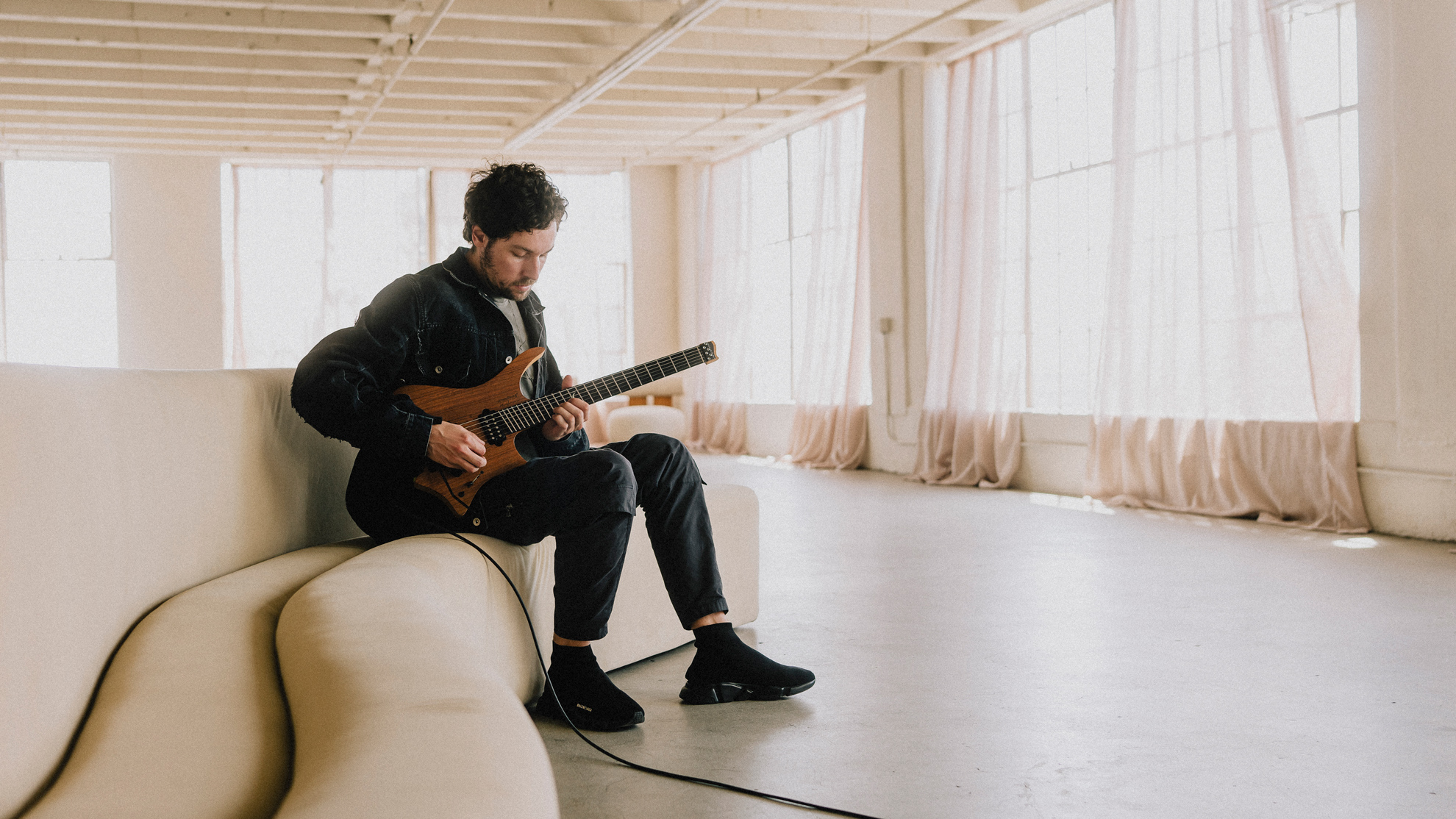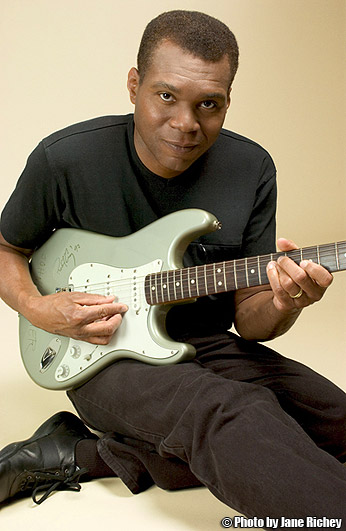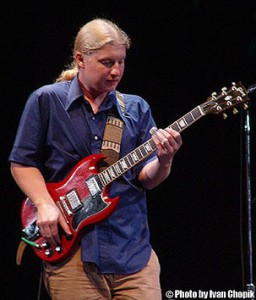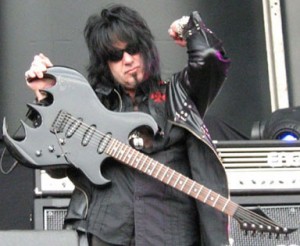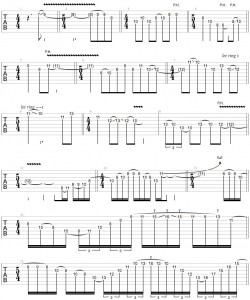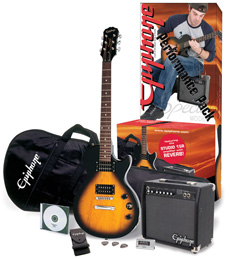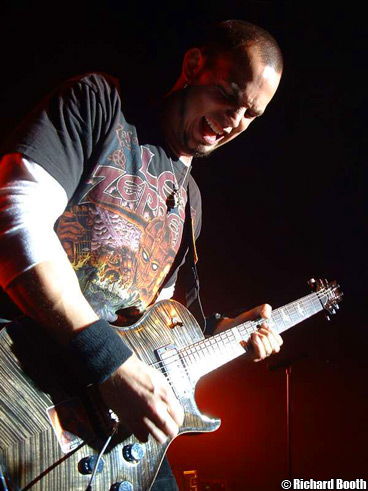 Mark Tremonti is a renowned guitarist and leader of rock powerhouse Alter Bridge, who just released their second album, Blackbird, in October 2007. The new record offers an intense collection of well-crafted songs, packed with loads of heavy riffing and powerful vocal melodies. Much to the delight of guitar enthusiasts, Tremonti also delivers a healthy dose of ripping guitar solos.
Mark Tremonti is a renowned guitarist and leader of rock powerhouse Alter Bridge, who just released their second album, Blackbird, in October 2007. The new record offers an intense collection of well-crafted songs, packed with loads of heavy riffing and powerful vocal melodies. Much to the delight of guitar enthusiasts, Tremonti also delivers a healthy dose of ripping guitar solos.
While many people know the Grammy Award winning guitarist and songwriter as a member of the multi-platinum selling Creed, with the new record Alter Bridge strongly establishes their own identity as an accomplished hard rock band. They are currently on tour in the U.S. – Check out www.alterbridge.com for tour dates.
IC: How is the tour going?
MT: It’s going great, man. We’re out here in Seattle right now, about a month into it. It’s been a blast.
IC: How do you find this tour to be different compared to the tour in support of the first Alter Bridge album?
MT: I guess more aggressive, more involved. Myles [Kennedy – Vocals] is playing guitar along with me, so a lot of the fans who have seen this tour and the past tour say it’s a huge difference with Myles on the guitar, and just his whole overall presence and the intensity of the shows – fans are really digging it. Even my best friend in the world came out the other night and said it’s almost like a whole new band.
IC: I think with Blackbird especially, you guys have really established yourselves as Alter Bridge, rather than “the band that was Creed.” Do you see your music going in even more of a different direction from here on out?
MT: We’ll just keep on pushing it. The only agenda we’ll have is not trying to sound like Creed at all, you know? If something sounds like our past we’ll just kinda nix it right then and there.
IC: What exactly led to the end of your relationship with Wind-up Records and the ultimate switch to Universal Records?
MT: Well, we weren‘t getting any support from them. We would show up to shows where promoters said they hadn’t heard from them. We’d show up to radio stations where they said they hadn’t heard from them. They dropped the ball, because they just wanted Creed back. They didn’t want Alter Bridge to succeed, because it would just prolong their not making the big dollars they made back in the day with Creed, and at the end of the day it was all about the dollars, I guess. There was a lot of bad blood there towards the end, so we had to part ways.
IC: When you say they wanted Creed back, is that a literal statement?
MT: Yeah, I mean we would hear through the grapevine or through interviews that people were saying ‘don’t count Creed out as something that’s gonna happen in the future,’ …and we’d said many times with Alter Bridge that that’s not gonna happen – that Alter Bridge is the band we wanna retire with. So it’s very frustrating.
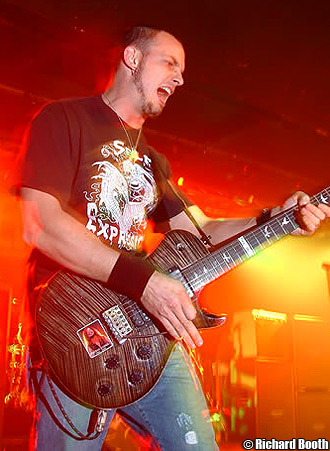 IC: Has your level of creative freedom changed at all since switching to Universal Records?
IC: Has your level of creative freedom changed at all since switching to Universal Records?
MT: Well, when we did this record, we didn’t even have a deal at the time. When we were finally mixing the record was when we signed a deal with Universal. The thing about the first record – you always have complete artistic freedom, but there’s always people that will give you their advice.
Even when we weren’t signed, we were talking with Tom [Mackay, SVP A&R] from Universal, and we chatted about what he liked, and what were his favorites. It’s just hard to see everybody’s point of view, ‘cause we live with these things for so long that sometimes the newness of it kind of wears off. That’s what’s good about working with our producer – it’s good to have these outside perspectives.
IC: I understand that you and Scott Philips [Drums] actually had to buy out your contract with Wind-up after the first album, but you just mentioned that you recorded the second album before you had a deal. Does that mean you guys funded that as well?
MT: Yeah, we funded both the buyout and the producing of the record.
IC: How did that affect the kind of deal you have with Universal now?
MT: Well, we have a licensing deal with Universal. So it’s like a profit-sharing deal with them. It’s a great partnership… I’m not the business head of the band, I like to just lock myself in the room and play guitar all day, so if our attorneys say it’s a good deal, it’s a good deal (laughs).
IC: Musically speaking, how would you describe the new album as compared to the previous one?
MT: Well, it’s more aggressive. We added Myles on the guitar, so it’s more layered… and just more interesting to listen to, I think, from a musician’s standpoint. But, still, our number one goal on every song is to make the melody the most important thing, and then to try and make the music as interesting as we can around it.
IC: Did you and Myles write the guitar parts together?
MT: Yeah, we would write songs on acoustic guitar and then bring it to the band and then we would change it to the electric format. He would have a guitar on the whole time and I would pretty much start playing the rhythm stuff on the verse, and a lot of times he would come in with an effect, (kind of like a U2, Edge type of sound) over top of the verses just to build up dynamics within the song. Myles got to cut a couple of solos on the record. Actually, only one made the record, but there’s a B-Side called “The Damage Done,” where we do a dual harmony lead thing that didn’t make the record. But Myles is a great player – he’s got a big fusion/shred past, and he’s definitely a top-notch guitar player that we really wanted to showcase.
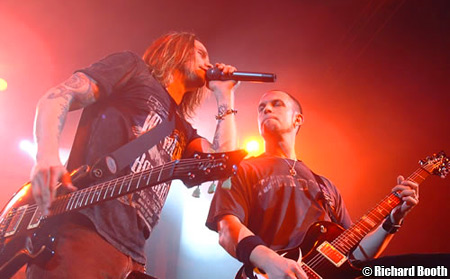
Alter Bridge Singer/Co-Guitarist Myles Kennedy with Mark Tremonti
IC: What song is he playing the lead on?
MT: On the tile track, “Blackbird,” he does the bluesier solo at the beginning of the huge solo section. In the second half I take it when the big guitars kick in. But in the first half he takes the more broken down, feely bluesy section.
IC: You’re known to be an avid supporter of guitar solos and more virtuosic playing in general. Do you see that kind of playing as something that’s going to be more present in the coming years?
MT: Yeah, I’ve seen it come out more and more. You know, back when we were first getting on tour back in the late 90’s there wasn’t much of it at all, if any. The only people we’d run into who were doing guitar solos were maybe Jerry Cantrell [Alice in Chains] or a handful of other guys. Nowadays, you see the guys from Trivium, Avenged Sevenfold, Children of Bodom… a bunch of the metal bands that are bringing it back out. You start to see a lot of good players surface, and hopefully it keeps up.
IC: You collaborated with Michael Angelo Batio on his latest record. What was that like?
MT: Oh, it’s great. Me and Michael are really good friends, and I’m actually gonna be playing with him next week. Yeah, he just asked if I wanted to do a spot on his record, and of course it’s an honor. It was just tough getting it done, because I didn’t have a studio – I actually had to mic up my rig at sound check and it was tough to get good tones. But it worked out – I’m glad I did it. He’s a great player.
IC: You mentioned you like to lock yourself away to play guitar all day. Do you have a specific practice routine or anything in particular that you’re working on nowadays?
MT: I kinda practice differently all the time. I just read a book called “Effortless Mastery” that Myles turned me on to. It really focuses on learning one thing at a time… you know, you sit down with the guitar and you’re trying to learn 15 things at a time, and you just dabble in all of them instead of mastering one that you can actually use at any given moment.
I get pulled up on stage a lot of times with players that are doing blues jams or whatnot, and you really find out where you’re really solid when that moment comes and you’ve got your bag of tricks that you know will always work for you. And you can’t add to that bag of tricks if you’re dabbling in too many things at a time. I think that hyper-focus on just the smallest little bits at a time is kind of how I’ve changed my way of attacking and learning things – just little bit by little bit.
 IC: If there was one person you could jam with right now, who would it be?
IC: If there was one person you could jam with right now, who would it be?
MT: I could just sit down and jam with? Jeez, probably Audley Freed… He’s a really slithery, slanky kind of blues player. I’m really into learning a lot of bluesy stuff right now and I like the guys who take it out of the norm and do something a little different. I love Stevie Ray Vaughan, but I’ve seen everybody and their brother and sister do his thing to death and I kind of want to find other styles, other players that I can check out that are doing something outside of the box. He’s just, like I said, this real slithery blues player with these great unique lines, and he’s definitely one of my favorites right now.
IC: In addition to Audley, what kind of stuff are you listening to these days?
MT: Oh man, I just got the new Joe Bonamassa record, which I’m real enthused about…he’s another guy I’d like to sit down with and [jam with].
IC: I’m actually interviewing him tomorrow.
MT: Oh cool, I already texted him and told him his new record was great. He’s one of my favorites as well, man. But yeah, I try to try to mix it up. I’m trying to get away from the shred stuff and stay more with the bluesier, feely stuff, ‘cause for my whole life I’ve just tried to dive into all the fast, super complicated stuff.
You realize once you get put in an improv setting with a band, you’re not gonna be doing all these over-the-top licks. You’re always going to fall back on, like I said, your little bag of tricks. You can learn a lot more, I think, about improv from the blues guys.
IC: What makes up your rig nowadays? How does it differ when you play live?
MT: On the studio record I used, of course, the [Mesa Boogie] Rectifiers and I layered it with a Bogner Uberschall for rhythm, which I do live. The only thing different from my studio rig is when I cut the leads for the record, I used a Bogner Ecstasy 101B, which I love in the studio, but live it’s a little thin for me.
So I was in Nashville and tried out the Bogner Shiva, and I absolutely loved it. It had more of that kind of Warren Haynesy, organic sound to it…a bigger, woollier kind of sound. So live I’m using that head, but the only problem with that is it’s only a 50-watt head. It couldn’t keep up with the Rectifier and the Uberschall, so I had to get the Mesa Boogie 2:90 power amp and run the effects loop through that power amp so it juices it up.
IC: And I believe you’ve got some special cab from Mesa that’s not your typical 4×12 cab?
MT: Yeah, I was doing a show once and this old guy came up to me and I was complaining about not enough low end in my rig, and he had told me about getting a Fender Showman that had 2×15’s in it in this real narrow, punchy cabinet. So I went and I bought one from a vintage shop for like two hundred bucks, and the guys from Mesa Boogie had seen it and said ‘we’ll build you the same specs to that cabinet, so that we can have the Boogie logo up there.’ And I said ‘absolutely,’ because mine was falling apart anyway. They built me a couple of them, and they’re great. It’s just that when I was using those, I was doing more rhythm stuff than lead stuff, and it didn’t quite work as much for leads – it kind of muddied it up. It’s great for real punchy rhythm stuff… but it’s been a long process of getting my rig to work well for both lead and rhythm settings.
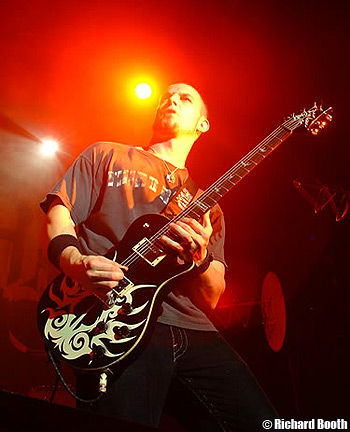 But now I just use four… kind of a pyramid. I have a straight stack down the middle and two cabinets to the left and right on the ground, with two Fender Twin ’65 reissues that I run in stereo for my clean tone. I learned that from an Eddie Van Halen interview, which made a lot of sense – to not blast yourself in the back of your head with your lead tone, because it just sounds harsh. So with my Shiva I go through two 4×12’s that are on the outside of the rig on the ground. That makes it a lot more bearable to listen to.
But now I just use four… kind of a pyramid. I have a straight stack down the middle and two cabinets to the left and right on the ground, with two Fender Twin ’65 reissues that I run in stereo for my clean tone. I learned that from an Eddie Van Halen interview, which made a lot of sense – to not blast yourself in the back of your head with your lead tone, because it just sounds harsh. So with my Shiva I go through two 4×12’s that are on the outside of the rig on the ground. That makes it a lot more bearable to listen to.
IC: You say you use Rectifiers – is that the Triple Rec?
MT: Yeah, I use the Triple Rec, but my favorite Boogies are the two-channel Dual Recs – that’s why I actually keep my favorite two Dual Rectifier two-channel ones at home so I never screw them up, so I can use them in my home studio.
IC: You have some pretty brutal rhythm tone on the new album. What is your philosophy for setting the EQ on your amps and getting the sound that you want?
MT: I’m a firm believer in having two different amps for each tone. For my rhythm tone I obviously mix up the Boogie and the Uberschall and I EQ them both differently. I usually have the Boogie kind of carry more of the midrange in there – I’ll have the mids maybe to 4 or 5 on the Boogie and have my low end up to about 6, 7. Same with my high end, it’ll be about 6 or 7. Then my Uberschall will lay a bit heavier into the low end, because when I switch to go to my lead tone I go to a different amp anyway, so the low tone doesn’t get in the way of my lead. So I have the Uberschall carry a lot of my lows, and keep the presence down on the Uberschall and keep the presence a little higher and the midrange a little higher on the Rectifier.
What we did on the record was we kept the gain really low, and it made it bigger in the end. It made it tighter and bigger, and that kept kind of spilled over now into my live rig. You know, I was one of those guys who used to keep my gain up to about 3 o’clock. Now I keep it down around noon, if you will (laughs).
IC: What’s your background in music education? Growing up, were you self-taught or did you work with a teacher?
MT: No, I was self-taught. I took one lesson, and he started to teach me this folk song, like Silent Night and stuff. This wasn’t what I wanted to learn, you know? He said, ‘What do you want to learn?’ I said, ‘Metallica, you know, the good stuff!’ And he said ‘no’ – we’d have to wait a long time before that. So I decided to not go back, and I just learned how to write on the guitar. It took me many, many years to be able to really play the guitar or develop my ear in any way. I mean, it was probably ten years before I really decided that I wanted to learn how play the instrument right.
I just used it as a writing tool all those years, and I’m glad I did that, ‘cause…well, it seems like there’s two types of guitar players/songwriters: You’ve got the guys who pick up a guitar just to learn to play the guitar, and then you’ve got the guys who pick up the guitar to write on the guitar and then learn along the way – and I’m one of those guys. I’m glad I took that route, because, it seems like when people get too into the theory right off the bat, they never get their head out of it. When they write, it always has to make theoretical sense first before it can be just a song and breathe in its own right, you know?
IC: Will you be releasing any instructional material?
MT: I just turned in six months of a column for Total Guitar. I’m not sure when it’s gonna come out. I’m planning on putting out a DVD in the next year, so I’m just trying to figure out how to make it different from your typical “Hot Licks” type of video. I wanna make it more of a “month in the life of” kind of thing, plus guitar lesson stuff.
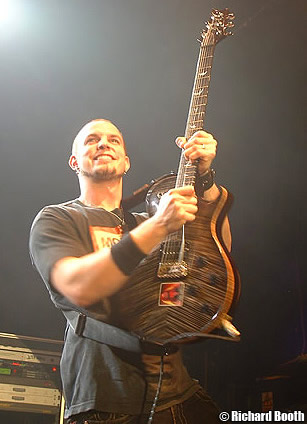 IC: What do you like to do in your free time?
IC: What do you like to do in your free time?
MT: Well, I’m a dad now, so I spend a lot of time with my son. Other than that, my free time is playing guitar. That’s why I live, why I do what I do, because I love it more than any other hobby.
IC: I heard that you were producing a little bit on the side as well, is that right?
MT: Well, we executive produced a soundtrack and then I produced a record by a band called Submersed a few years ago. It probably wouldn’t be something I’d do anytime time soon again. I’d probably wait, you know, five or ten years. It’s just, when I work on somebody else’s stuff, I just sit there wondering why I’m not working on my own stuff, you know? (laughs)
IC: Do you have your own studio? Is that how you recorded the new album?
MT: We recorded the new album at Blackbird Studio in Nashville, and then we did the rest of it at Michael Baskette’s studio in Virginia Beach. The first record we did at my house.
IC: Was Blackbird Studio the inspiration for the new album title?
MT: No, we had the song “Blackbird” written before we knew we were gonna record there. The story behind that, is that a good friend of Myles’ had just passed away when we were finishing writing the song and he wrote the lyrics about him. His friend taught him how to play “Blackbird” by the Beatles – it was like, one of the first songs he’d ever learned, so he referred to his friend as Blackbird. It’s pretty much a song about wanting him to go find a better place. Anyway, since it was our favorite song on the record, and it’s where we recorded the record, we thought it would be a good album title.
IC: Where do you see Alter Bridge going to in five, ten years?
MT: Hopefully we can just sustain a big touring career – that’s why we do this. All of us rock bands are just fighting for survival. So as long we’re still doing it in five, ten years, I’ll be a happy man.
IC: Is there any advice you can give to aspiring musicians?
MT: Just have patience and either find a good teacher, or find great inspiration and great players.
Special thanks to Chris Dingman for the transcription of this interview.



